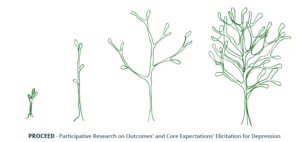By psychiatrist and public health PhD student Astrid Chevance (@ChevanceAstrid), METHODS team, Paris, France.
What do people experiencing depression expect from treatment? The question seems to be simple at first glance: surely, people want to be “cured” or “be better”? Even if we accept this, what do these terms really mean? Is “cured” or “better” the same for everyone? When you think about it, this question isn’t as easy to answer as it first appears, a problem echoed in the literature.
I’m interested in participatory action research, whose philosophy actively involves participants in making changes. Participatory research aims to increase the social utility of science. Making evidence-based mental health research more participatory could facilitate the implementation of results in clinical practice. Systematically involving patients and carers in studies as participants (not ‘subjects’) could improve the relevance of results to their priorities.
As a psychiatrist, I value shared decision-making about treatments. For depression, we have numerous clinical effectiveness evaluations, of around twenty antidepressants and several psychotherapies. Too often, however, trial outcomes are difficult to explain, not personally meaningful, and sometimes, not relevant to patients at all. For instance, what does it mean for a person with depression, that if they take a medication, it will lower their score on this or that scale by three points, when their priority is improved mood? Evidence about patient expectations of depression treatment remains limited.
My PhD is at the intersection of these two interests: participatory research and finding patient-relevant outcomes to evaluate the effectiveness of depression treatments. We’re working towards a core outcome set (COS) for depression: a minimum, agreed set of validated, standardized outcomes which should be measured in every trial. We’re currently developing participatory methods for each step towards a depression COS, which captures and preserves all stakeholder views.
PROCEED aims to identify what patients, carers and clinicians expect from treatments for depression. It’s an international online survey, comprising a brief, anonymous questionnaire available in English, German or French. Although several thousand French speakers have participated, we’ve received far fewer responses from English and German speakers. We need your help to share the survey with your social networks, to increase the diversity of views we capture and we’d be delighted if you’d consider taking part at this link. You’re eligible if you:
- Are over 18 years old AND
- Previously or currently experienced a depressive episode OR
- Are an informal caregiver, (a family member or friend of someone who previously or currently experienced a depressive episode) OR
- Are a healthcare practitioner working with people with depression, e.g. a psychiatrist, psychologist, nurse, general practitioner, family doctor.
The survey is conducted by Astrid Chevance (astrid.chevance@clinicalepidemio.fr), under the supervision of Professor Ravaud, METHODS, CRESS, France. The protocol of this study was approved by CEEI/IRB (IRB00003888), Paris, France, on 15/05/18. The study was declared to the French Data Protection Authority (CNIL).